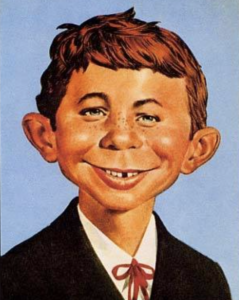“You can destroy your now,
by worrying about tomorrow.”
He was an unlikely cover boy. His distinct face, parted red hair, gap-tooth smile, freckles, protruding nose, and scrawny body, first graced the cover of the magazine in November of 1954. He would appear on all but a handful of the magazine’s over 550 issues, being last seen on the final publication in November, 2019. The publication was “Mad Magazine“, the cover boy was Alfred E. Newman and his mantra was simple, “What – Me worry?”
Mad was an American humor magazine first published in 1952. It was launched as a comic book series before it became a magazine in 1956. During its circulation peak, in the mid-70’s, readership was over two million. What was unique however was the lack of advertising. The magazine’s absence of advertising, enabled it to satirize the materialist culture of the 60’s and 70’s without fear of reprisal. In essence the magazine lived Neuman’s words, “What – Me worry?”
For a number of years I kept a picture of Neuman and those words on a credenza in my office. It would often become a conversation point. Dare I say, very few millennials were familiar with the face or quote. When asked about the picture’s significance, I would simply respond, “Words to live by.” When pressed further, I would share a simple lesson learned many years earlier from Harry (my father), Neuman and Zig (Ziglar). Life is about control. Our destiny is our choice. The lives we have today and will have tomorrow are the products of our actions, hence worry is stewing without doing. Never worry about what you have control over, because you have control over it, and never worry about what you don’t have control over, because you don’t have control over it. Hence…..What – Me worry? So how is this accomplished?
In the ancient world, virtue consisted of four key components; Courage, Temperance, Justice and Wisdom. Two derivatives of these virtues play a significant role in shaping our daily lives ; self-control and self-discipline. While closely related and often used interchangeably, there is a difference. Self-discipline refers to our ability to control impulses, desires, and behaviors, while self-control reflects our ability to manage emotions, thoughts, and actions in a balanced and deliberate manner. Combining these attributes sets the stage for personal growth, success, overall well-being and a controlled life.
Self-discipline and self-control are essential for achieving personal goals. Self discipline enables productive habits, the establishment of clear priorities, and commitment to tasks even when faced with difficulties. Self-control, on the other hand, allows individuals to manage their impulses and avoid impulsive behaviors that can hinder progress towards their goals.
Self-discipline and self-control are also crucial for maintaining good physical and mental health. With self-discipline, we can establish healthy habits such as regular exercise, proper sleep, and a balanced diet. Self-control also plays a significant role in managing stress, anxiety, and other negative emotions. It enables individuals to control emotional responses and make rational decisions even in emotionally charged situations.
Self-discipline and self-control serve to build positive relationships based on trust, respect, and understanding. We all know that relationships require effort, patience, and emotional regulation. Self-discipline and self-control help us maintain healthy boundaries, avoid toxic behaviors, and make rational decisions based on values and principles rather than impulsive reactions. We live in a time of abundance that provides us with the opportunity to make choices that our ancestors would have never imagined. As Ryan Holiday notes in his book, Discipline is Destiny: The Power of Self Control, “We are warm in the winter, cool in the summer, full far more than hungry. We can go where we want. Do what we want. Believe what we want. WIth the snap of our fingers, pleasures and distractions appear.” The reality is life isn’t fair! Gifts and opportunities are not handed out evenly, but worrying over this will not serve to resolve it. From self-discipline and self-control comes our ability to shape our own lives and control our own destiny. The realization of this enables one to then say, “What – Me worry?”
Embrace the Challenge.

